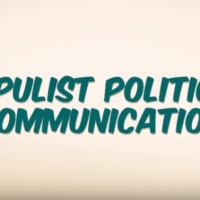Spotlight on populist communication in Europe: “malady of our democracy”.
On 26 November 2018, Professor Toril Aalberg, chair of the COST Action Populist Political Communication in Europe, moderated and participated in the session:
How can research help safeguard democracy? organised by the Norwegian University of Science and Technology (NTNU). The conference took place at the Renaissance Brussels Hotel, Rue du Parnasse 19, 1050 Brussels.
“Recent developments and the current political landscapes represent major challenges to European societies. Many countries see a rise of populism and disinformation campaigns. The increase of conflict-loaded political communication and interaction between citizens, media and politicians may pose a threat to core democratic values.”
Professor Aalberg gave her insight on how research can help safeguard democracies and democratic values, for instance by pushing the research agendas and design towards studies that help solve current and future problems.
“Researchers need not only help safeguard democracies, but also secure and help rescue democracies. Participants at the conference agreed that there is a need for a strong commitment to the social sciences, because although technology can help in many ways, we cannot create good democratic societies without the insight that the social sciences and humanities give us.
Technologies can create algorithms that prevent hate to be expressed, but this will not change the reasons behind the frustration many citizens feel. We need to consider not only the scientific facts, but also, bias, values and emotions. We need to provide information for political representatives about public opinion, and information for citizens about representatives’ behavior. To do this we need open dialogue, cooperation and transparency related to the scientific process. COST networks offer one important step in this direction.”
The COST Action she led was awarded the EU4FACTS prize by the Joint Research Centre (JRC) for their animated video on media populism.
Follow the link for the Conference programme.
More information on the Action
This Action brings together researchers to investigate populist political communication and its impact on democratic political life across Europe. This is necessary not only in light of recent populist backlashes in many democracies against governments and political and economic developments, but also in respect to changes in national media and communication systems. In order to comprehend this poorly understood aspect of contemporary political communication this Action will examine three interconnected but distinct aspects of populist political communication:
- First, populist political communicators and their strategies.
- Second, the media and populist discourses and frames.
- Third, citizen’s engagement with populist political messages and the effect of these messages.
This Action will provide a thorough critical review of existing knowledge, much improved research co-ordination, widen co-operation between scholars, bridge gaps in existing knowledge and strengthen dialogue with various societal stakeholders, benefiting media organizations, NGOs and policy actors as well as the wider scientific community.
